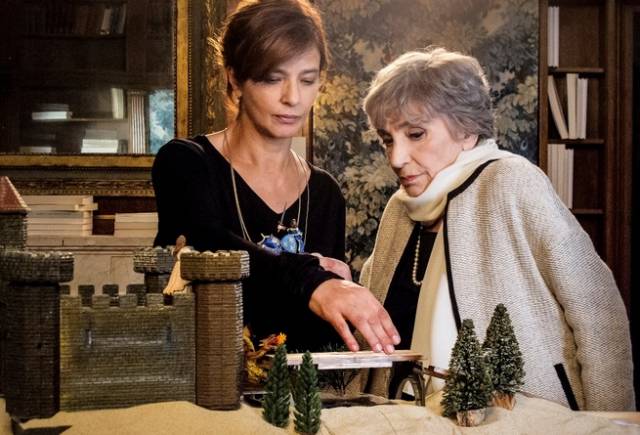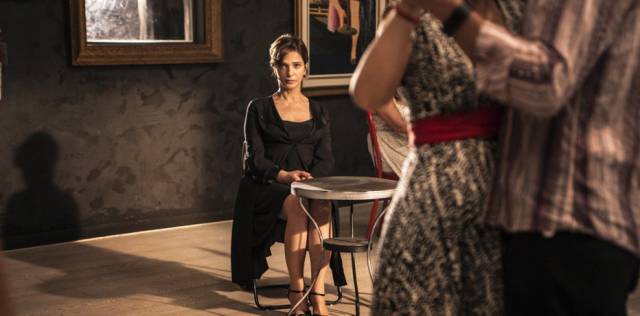
 Flavia, the unlikely heroine of Laura Morante’s comedy Solo (Assolo), is a neurotic mess. Suffocatingly insecure, she’s at a crucial crossroads: newly single, job on the line, children all gown up. Perpetually stuck, and in an existential panic now that life’s proverbial doors are closing on her, Flavia (played by the ever-luminous Morante) suddenly finds herself unable to play second fiddle to her ex-husbands, their wives, her sons, their girlfriends, her ex-lovers and female friends on whom she is chronically dependent.
Flavia, the unlikely heroine of Laura Morante’s comedy Solo (Assolo), is a neurotic mess. Suffocatingly insecure, she’s at a crucial crossroads: newly single, job on the line, children all gown up. Perpetually stuck, and in an existential panic now that life’s proverbial doors are closing on her, Flavia (played by the ever-luminous Morante) suddenly finds herself unable to play second fiddle to her ex-husbands, their wives, her sons, their girlfriends, her ex-lovers and female friends on whom she is chronically dependent.
But Flavia is far too oblivious and terrified to notice her own desire for freedom, leaving it up to her psychoanalyst (the wonderfully assuring Piera Degli Esposti) and a series of deliciously unfortunate events to—hopefully—guide her through the process of awakening and self-actualization she desperately—super deep down in her psyche—craves.
As a woman whose own life has evolved and expanded over the years, from her beginnings as a dancer, to a wildly successful career as an actress (Bianca, The Son’s Room and The Dancer Upstairs to name just a few), to writing and directing features, Morante is in full command in a universe far from the one in which her character can barely function. I spoke with the Tuscan beauty about her second time in the director’s chair the day Solo premiered at The Film Society of Lincoln Center’s Open Roads: New Italian Cinema.
How was directing Solo different from your first experience with Cherries on the Cake (La cerise sur le gâteau)?
The first film was shot in French in France. Although it was personal and close to my heart because I speak the language, lived there and have a close relationship with French culture and people, there was still a small distance. I was directing actors in another language, so that was a major difference between the first film and the second.
When I shot the first film, I wasn’t really aware of my responsibilities. I wasn’t supposed to shoot the movie as a director. It was the producer’s idea. I didn’t want to direct. I wrote the screenplay with my partner [Daniele Costantini], and we sold it. We were looking for a French director, but we couldn’t find the right one, so the producer said to me, “Do you want to direct the movie yourself?” I said, “I’m not sure.” And it went like this. But the second time, I felt a big responsibility.
Were you at all intimidated by the prospect of directing the first time? Or, are you an adventurous person?
I am, in fact, an adventurous person!
Yes, I was afraid. But it was a challenge, and I’m always interested in a challenge.
 Flavia is at a really interesting point in her life when we meet her. As she puts it, all these doors are closing, and she’s scared. In reality, however, she never walked through these metaphorical doors when she was younger.
Flavia is at a really interesting point in her life when we meet her. As she puts it, all these doors are closing, and she’s scared. In reality, however, she never walked through these metaphorical doors when she was younger.
She thinks that she only sees closed doors around her, but it’s the therapist that makes her see there is not an objective reason to feel that way. She doesn’t want to get in, she wants to get out, but she doesn’t know. She has built a life like a closed net. She is deeply insecure and thinks that this net protects her, but in fact, it’s like a prison. She thinks she needs her ex-husbands and their wives, her sons, her therapist.
Many insecure people build a safety net around them, but as I mentioned, the safety net becomes a prison. A therapist switches your point of view and makes you see something you see a certain way, differently. It’s like the glass half full or half empty. The therapist tries to make her see things differently, asking Flavia, “What does getting older mean to you?” And she says, “These doors are closing.” But we know she doesn’t want to enter, she wants to get out out. It’s a cry for help to be free.
Instead of wanting to enter these closing doors, she wants to be free of them because they don’t actually represent opportunity. They represent cultural limitations on women.
At one point Flavia follows the therapist [after their session] and the therapist [later] asks, “Why do you do such a thing? You did it because you wanted to show yourself that I’m a normal person. In a way you want to free yourself from my power. The same with all the people around you. Why is it that you’ve suddenly discovered that the wife of your ex-husband is not perfect, the other one is not perfect? Because you want to free yourself. So you’re asking me— even if you are not aware of this— to free you. To tell you the therapy is over.”
What is it about her personality that makes her shut down so early in life?
The first part of the movie is the light, more humoristic side of the film that tries to give an explanation as to why she is the way she is. We tried to keep it light and have fun with it, using a lot of paradox. You don’t know if these things really happened or not, although some things really did happen to some people I know. For example, Flavia’s best friend sleeping with her boyfriend is something that really happened.
It’s a parody of psychoanalysis where you always have a childhood trauma, things that happened to you that are supposed to make you a certain way when you are an adult. Personally, I was very shy and private and insecure as a child, and it took a long time for me to become a normal person. I was one of many siblings, and even my brothers’ friends would go to my house, and although they knew they had a sister, these friends never saw me. As soon as they rang the bell I would run away.
When did you begin to blossom out of your shell?
Tomorrow! (Laughs)
The film then takes a more serious tone. The scene in which Flavia's family pretend that she is losing her mind is particularly troubling because she's not only being humiliated, but also made to believe she's crazy, and she believes it. What inspired that scene?
That is one of those scenes that was inspired by my real life family. My aunt, my mother’s sister, was very fragile and insecure. All her brothers would play a joke on her, do this kind of game. But it would end in such a dramatic way. She would cry and be really hurt and want to know what really happened. They didn’t realize how much they were hurting her, they were just having fun.
 It is one of the most heartbreaking moments.
It is one of the most heartbreaking moments.
I agree with you. Whenever my mother would tell me the story, it really hurt. It really hurt her just recounting the story. My mother was considered the “good one,” so my aunt would say, “Please, you’re a good girl. Tell me the truth.”
I loved the use of colors in Solo. What was the significance of the color red for Flavia?
For some reason, I don’t know why, but red became, in my mind, the color of challenge, freedom, courage, rebellion. Things that are not very obvious in Flavia. For example, the sensual tango she will never dance, the red hat she buys that she will never wear. When she goes to buy a car, everyone tells her to buy a grey one because they say it’s right for her. You feel that she doesn’t want this grey color. But she is not fully aware of her needs or her desires.
Does she hit rock bottom after a regrettable sexual encounter?
She can’t go any lower.
There is a shift in her thinking at that point. She flees from the man’s place, hops in a cab and shares a lovely moment with the female driver.
The smile between Flavia and the cab driver was inspired by a true event that happened when I was living in Paris. I was having a bad time at a party and left in a cab in the early morning. Driving along the Seine, we stopped and another taxi stopped next to us. A young girl around my age was sitting in the back, and we exchanged a smile and waved to each other, as if to say, “We are in the same situation.”
The scene represents Flavia’s condition. The smile represents the empathy the cab driver feels with her and what Flavia’s been doing the whole movie. She’s been preparing herself for an “assolo” [to be single] that perhaps will happen.
For more on Open Roads: New Italian Cinema click here.